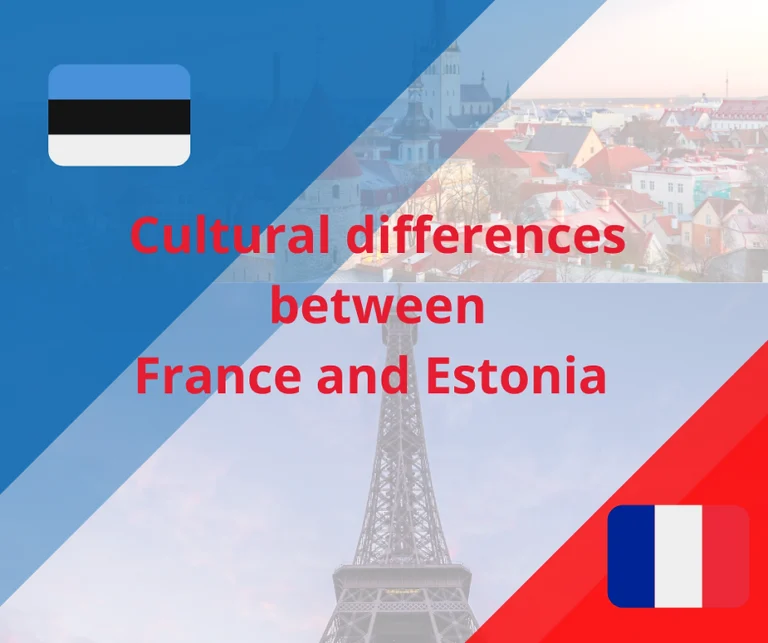
Exploring Franco-Estonian cultural differences: Key to successful international partnerships

Communication and Work Style
In Estonia, exchanges between the different levels of hierarchy are more permeable , encouraging direct exchanges and the free expression of opinions, even if they run counter to management.
In France, on the other hand, questioning authority can be frowned upon.
Time and Flexibility
In Estonia, payments are processed quickly, with payment of an invoice expected within a week of issue, whereas in France, payment times can extend to 30 days or more. Similarly, responsiveness to e-mails is higher in Estonia, where replies are sent within half a day, whereas in France it’s more common to wait a few days before replying.
Approach to Negotiation
This is because Estonians believe that the proposed tariff is generally a fair price that is not up for negotiation.
Professional seduction
Seducing the customer to sell one’s product is a French art that can be confusing at first.
However, Mari-Liis notes that she has learned to understand and integrate this dynamic, which seems to be an integral part of the French professional fabric.
Teleworking
This telecommuting culture can be attributed to a number of factors, including mutual trust between employers and employees, and technological advances that facilitate remote collaboration.
In France, the notion of presence at work is highly valued, often translating into a pronounced presenteeism where employees are expected to be in the office from 9am to 7pm.
Although telecommuting has gained in popularity, a perception persists that working from home means less work done.
Attitudes towards age and education
In Estonia, it’s common for a relatively young person to occupy a managerial position. This approach is based on the recognition of individual skills and merits, irrespective of age.
In France, on the other hand, age is often perceived as an important criterion for occupying positions of responsibility, which can sometimes limit opportunities for young talent.
What’s more, the social norms surrounding education vary between the two countries. In Estonia, possession of a Master’s degree is highly valued and can open many professional doors.
In France, possession of a Master’s degree is not as highly valued, in the sense that to exercise a certain profession you need to hold a diploma in that precise field and not just any Master’s degree.
Attitudes towards Employee Well-Being and Alcohol Consumption
In France, although the issue of well-being is taken into account, bureaucratic and cultural obstacles can hinder its implementation. This disparity is particularly noticeable between large companies, which often offer ergonomic benefits and adaptations, and VSEs and SMEs, where access to such benefits is more limited and often requires complex procedures involving the occupational physician.
Finally, Mari-Liis points out an interesting difference when it comes to alcohol consumption at business meetings. In France, it is often considered normal to have a glass of alcohol at business meetings, which can be seen as a way of lightening the mood and strengthening social ties.
In Estonia, on the other hand, the consumption of alcohol during business meetings is less common, and even inappropriate in certain contexts.
Conclusion
By recognizing and respecting these nuances, companies can not only avoid misunderstandings, but also build solid, mutually beneficial partnerships based on mutual respect and awareness of the cultural specificities of each country.
With this in mind, the bi-cultural support offered by CAdFE to facilitate exchanges between companies is of crucial importance.
By offering a holistic approach, CAdFE helps to overcome cultural barriers and maximize collaboration potential, thus contributing to the success of cross-border partnerships between Estonia and France.
Disclaimer:
It is important to note that these perceptions are subjective and may vary from person to person.
They are not intended to represent an absolute truth, but rather to offer an insight into individual experiences of cross-border collaboration.
Contact us!

✉ contact@ccife.ee
CCI France-Estonie is proudly affiliated to CCI France International, the worldwide network of French Chambers of Commerce and Industry.
Download the CCIFI Connect application
Accelerate your business thanks to the 1st private network of French companies in 94 countries: 119 chambers | 33,000 companies | 4,000 events | 300 committees | 1,200 exclusive advantages
Exclusively for members of the CCI Françaises à l’International, discover the CCIFI Connect app.
Website
Stay informed!
Made with ❤ by Cycoma
Copyright 2024 Chambre de Commerce et d’Industrie France Estonie
Contact us!

✉ contact@ccife.ee
CCI France-Estonie is proudly affiliated to CCI France International, the worldwide network of French Chambers of Commerce and Industry.
Download the CCIFI Connect application
Accelerate your business thanks to the 1st private network of French companies in 94 countries: 119 chambers | 33,000 companies | 4,000 events | 300 committees | 1,200 exclusive advantages
Exclusively for members of the CCI Françaises à l’International, discover the CCIFI Connect app.
Website
Stay informed!
Made with ❤ by Cycoma
Copyright 2024 Chambre de Commerce et d’Industrie France Estonie



